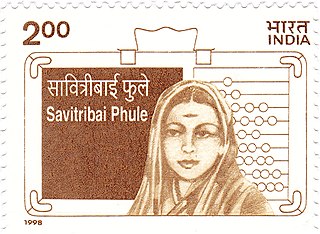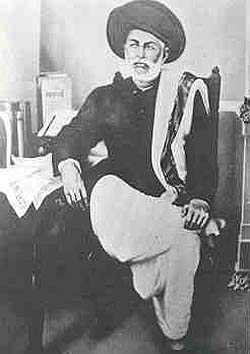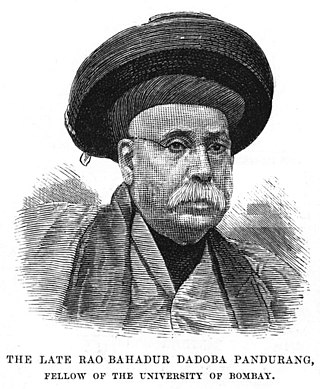Related Research Articles

Jyotirao Govindrao Phule was an Indian social activist, businessman, anti-caste social reformer and writer from Maharashtra. His work extended to many fields, including eradication of untouchability and the caste system and for his efforts in educating women and oppressed caste people. He and his wife, Savitribai Phule, were pioneers of women's education in India. Phule started his first school for girls in 1848 in Pune at Tatyasaheb Bhide's residence or Bhidewada. He, along with his followers, formed the Satyashodhak Samaj to attain equal rights for people from lower castes. People from all religions and castes could become a part of this association which worked for the upliftment of the oppressed classes. Phule is regarded as an important figure in the social reform movement in Maharashtra.The honorific Mahātmā, was first applied to him in 1888 at a special program honoring him in Mumbai..

Vasudev Balwant Phadke was an Indian independence activist and revolutionary who sought India's independence from colonial rule. Phadke was moved by the plight of the farming community and believed that Swaraj was the only remedy for their ills. With the help of various sub-communities of Hindu society he created a movement against British rule. The group started an armed struggle to overthrow the colonial government, launching raids on wealthy European businessmen to obtain funds for the purpose. Phadke came to prominence when he got control of the city of Pune for a few days after catching colonial soldiers off-guard during a surprise attack.
Tarabai Shinde (1850–1910) was a feminist activist who protested patriarchy and caste in 19th century India. She is known for her published work, Stri Purush Tulana, originally published in Marathi in 1882. The pamphlet is a critique of caste and patriarchy, and is often considered the first modern Indian feminist text. It was very controversial for its time in challenging the Hindu religious scriptures themselves as a source of women's oppression, a view that continues to be controversial and debated today. She was a member of Satyashodhak Samaj.

Savitribai Phule was one of the first female teachers in India, a social reformer, and poet. Along with her husband, Jyotiba Phule in Maharashtra, she played a vital role in improving women's rights in India. She is considered to be the pioneer of India's feminist movement.She strived to abolish discrimination and unfair treatment of people on the basis of caste and gender. She and her husband were pioneers of women's education in India. They started their first school for girls in 1848 in Pune at Tatyasaheb Bhide's residence or Bhidewada.

The Bhandari community is a caste that inhabits the western coast of India. Their traditional occupation was "toddy tapping". They form the largest caste group in the state of Goa, reportedly being over 30% of that state's Hindu population, and play a major role in deciding the future of any political party there. Bhandaris are included in the list of Other Backward Classes (OBCs) in Goa and Maharashtra.

Satyashodhak Samaj was a social reform society founded by Jyotiba Phule in Pune, Maharashtra, on 24 September 1873. The society endeavoured to mitigate the distress and sufferings of Dalits and women. It espoused a mission of education and increased social rights and political access for underprivileged groups, focused especially on women, peasants, and Dalits, in Maharashtra. Jyotirao's wife Savitribai was the head of women's section of the society. The Samaj disbanded during the 1930s as leaders left to join the Indian National Congress party.
Paramahansa Mandali was a secret socio-religious group, established in 1849, in Bombay and is closely related to Manav Dharma Sabha which was found in 1844 in Surat. It was started by Durgaram Mehtaji, Dadoba Pandurang and a group of his friends. Dadoba Pandurang assumed leadership of this organisation after he left Manav Dharma Sabha. He outlined his principles in Dharma Vivechan in 1848 for Manav Dharma Sabha and "Paramhansik Bramhyadharma" for Paramahansa Mandali. It acted as a secret society and is believed that the revelation of its existence in 1860 hastened its demise.

The Mali are an occupational caste found among the Hindus who traditionally worked as gardeners and florists. They also call themselves Phul Mali due to their occupation of growing flowers. The Mali are found throughout North India, East India as well as the Terai region of Nepal and Maharashtra. Iravati Karve, an anthropologist, showed how the Maratha caste was generated from Kunbis who simply started calling themselves "Maratha". She states that Maratha, Kunbi and Mali are the three main farming communities of Maharashtra – the difference being that the Marathas and Kunbis were "dry farmers" whereas the Mali farmed throughout the year.
Yusufkhan Mohamadkhan Pathan is an authority on Maratha saints. He was born on 1 March 1930. He has been head of department, Marathwada University, Aurangabad, Maharashtra, India In 2007, he received a Padma Shri award from the Government of India for excellence in literature and education. O'Hanlon cites his as the editor of Bhausahebanchi bakhar, Deshpande cites him as the editor of the Sabhasad Bakhar. In 2004 he received the Indian Independence day Certificate of honour for Persian language.
Balaji Pant Natu was a spy working for the British against the Peshwa Bajirao II during the era of Maratha Confederacy in the Third Anglo-Maratha War. He belonged to the Chitpavan Brahmin community of Maharashtra and came from the powerful Natu family of Pune. When the British forces entered Shanivar Wada on November 18, 1817, Natu unfurled the Union Jack over the building. Before he became an agent for the British governor of Bombay, Montstuart Elphinstone, he served the Raste family.

Narayan Meghaji Lokhande was the father of trade union movement in India. He is remembered not only for ameliorating the working conditions of textile mill-hands in the 19th century but also for his courageous initiatives on caste and communal issues. Apart from this he was also awarded the title of Rao Bahadur in 1895 for his work during riots between Hindus and Muslims. "Justice of peace" was awarded with great respect to him by the then British Indian Government. The Government of India issued a postage stamp with his photograph in 2005.
Naoroji Furdunji (1817–1885) was a Parsi reformer from Bombay.

Rao Bahadur Hari Raoji Chiplunkar (1842–1896), Honorary Magistrate and President of the Landlord's Association in Poona, was a reformer, activist, and philanthropist, and close friend of intellectual and reformer, and founder of Satyashodhak Samaj, Jyotirao Phule. A prominent figure in the social and intellectual circles of the Bombay Presidency, primarily Poona, Chiplunkar donated his land and funds, enabling Savitri and Jyotirao Phule to start the first girls schools in India in 1851 on Chiplunkar's estate, including donating a building for the primary education of lower caste children in 1864, currently operating as the Bholagir School, Municipal School No. 4.

Dadoba Pandurang (Tarkhadkar) (9 May 1814– 17 October 1882) (Pune, Maharashtra, British India) was a social reformer and linguistic from Bombay. He was born with the surname Tarkhadkar in a Maharashtrian Vaishya family, but he never used it in later life. He wrote extensively on religion and social reform as an opponent of rituals and caste, while supporting widow-remarriage and education for women. He was two brothers of Atmaram Pandurang and Bhaskarrao Pandurang Tarkhadkar.He had three daughters named Durga,Manik and Annapurna. Annapurna was known as Anna, she was the first girl in Maharashtra who went abroad for higher education. Anna and young Rabindranath Tagore were very close, and the latter is supposed to have penned poems for her.

Pandharinath Sitaramji Patil (1903–1978) was an Indian social reformer, politician, and activist of the non-Brahmin movement. He was one of the earliest biographer of Jotirao Phule.
Dnyanodaya is a Marathi periodical published by the American Marathi Mission, a Protestant missionary group.

The Raghojirao Ramjirao Bhangre also spell Bhangaria was an Indian revolutionary who challenged and defied the British power in Maharashtra. He was the son of Ramji Bhangare, a Koli who also resisted the British rule and was subsequently hanged in Cellular Jail. He was only ten years old when he took up arms against British rule in Maharashtra.
Tanubai Birje (1876-1913) was a social activist and a member of Satyashodhak Samaj—Truth Seekers' Society—founded by Mahatma Jotirao Phule. She edited the magazine Deenbandhu from 1908 through 1912. She was the first Indian woman to edit a news magazine.
Bapuji Bhangare was a Koli Patil of Deogaon and Indian freedom fighter who challenged the British government in Maharashtra state of British India. Bapuji Bhangare breakdown the British government strongly in Pune, Ahmadnagar and Nashik districts of Maharashtra.
References
- ↑ O'Hanlon, Rosalind (2002). Caste, Conflict and Ideology: Mahatma Jotirao Phule and Low Caste Protest in Nineteenth-Century Western India (Reprinted, revised ed.). Cambridge University Press. p. 244. ISBN 978-0-52152-308-0.
- ↑ Kidambi, Prashant (2016). The Making of an Indian Metropolis: Colonial Governance and Public Culture in Bombay, 1890-1920. Routledge. p. 271. ISBN 978-1-35188-624-6.
- ↑ Phadke, Y. D. (1975). Social Reformers of Maharashtra. Maharashtra Information Centre.
- ↑ Natarajan, Nalini; Nelson, Emmanuel Sampath, eds. (1996). Handbook of Twentieth-century Literatures of India. Greenwood Publishing Group. p. 214. ISBN 978-0-31328-778-7.
- ↑ Charlesworth, Neil (2002). Peasants and Imperial Rule: Agriculture and Agrarian Society in the Bombay Presidency 1850-1935 (Revised ed.). Cambridge University Press. p. 277. ISBN 978-0-52152-640-1.
- ↑ Keer, Dhananjay (1997). Mahatma Jotirao Phooley: Father of the Indian Social Revolution. Popular Prakashan. ISBN 978-81-7154-066-2.
- ↑ O'Hanlon, Rosalind (2002). Caste, Conflict and Ideology: Mahatma Jotirao Phule and Low Caste Protest in Nineteenth-Century Western India (Reprinted, revised ed.). Cambridge University Press. p. 247. ISBN 978-0-52152-308-0.
- ↑ O'Hanlon, Rosalind (2002). Caste, Conflict and Ideology: Mahatma Jotirao Phule and Low Caste Protest in Nineteenth-Century Western India (Reprinted, revised ed.). Cambridge University Press. p. 288. ISBN 978-0-52152-308-0.
- ↑ "तानुबाई बिर्जे : शतकापूर्वीची मराठी स्त्री-संपादक". Loksatta (in Marathi). 6 March 2016. Retrieved 3 February 2020.
- ↑ Joshi, Prasad (22 September 2013). "Once the voice of Phule, Deenbandhu press rusting away into oblivion". The Indian Express. Retrieved 20 July 2017.